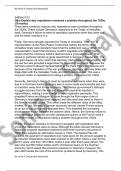Essay
Cambridge AS-Level History (9489) Paper 2 The International Option: International history, 1870–1945 Sample Essays
- Course
- Institution
A collection of eight A* standard essays for Cambridge AS-Level History (9489) Paper 2 The International Option: International history, 1870–1945. I achieved an A* for History in the Cambridge A-Level October/November 2022 Examinations and was awarded the Outstanding Cambridge Learners High Achie...
[Show more]



